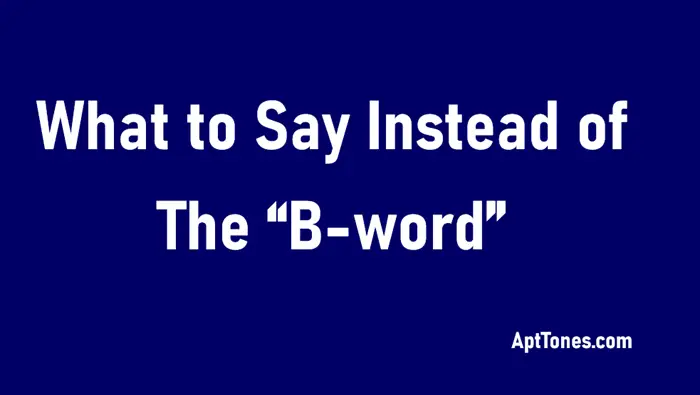Words matter more than most people realize. The language we use shapes how others see us and affects every relationship we build, whether at work or at home.
Certain terms can damage relationships and hurt your reputation, especially words that target or demean others. The “B-word” is one of those terms that can instantly change how people view you, no matter the situation.
This guide offers 25 better alternatives that help you communicate your point without crossing lines. Each option comes with clear explanations about when and why to use it, so you can speak confidently while keeping respect intact.
What to Say Instead of the “B-word”: 25 Alternatives

1. “Difficult”
Appropriate when referring to someone who is challenging to work with or deal with.
Example:
Working with Jenna can be difficult at times, but it’s important to understand her perspective and find common ground.
2. “Assertive”
Useful for describing someone who is strong-willed or forthright in their opinions.
Example:
Lena is quite assertive in meetings; she always speaks her mind and stands by her ideas.
3. “Firm”
Suitable for someone who is unyielding or steadfast in their decisions or beliefs.
Example:
Thomas is firm in his management style, which sometimes leads to disagreements, but he always has the team’s best interest at heart.
4. “Strong-Willed”
Describes someone who has a strong determination or will.
Example:
Marie is strong-willed, which makes her an excellent leader during challenging projects.
5. “Opinionated”
For someone who holds and expresses strong opinions.
Example:
Carlos is quite opinionated, but his insights often lead to productive discussions.
6. “Uncompromising”
Describes someone who does not easily yield or compromise.
Example:
As a negotiator, Sarah is uncompromising, which has proven effective in several tough situations.
7. “Determined”
Useful for someone who is resolute and persistent.
Example:
Kevin’s determined nature has helped him overcome many obstacles in his career.
8. “Challenging”
Refers to someone who presents a challenge in terms of interaction or cooperation.
Example:
Working with Alex can be challenging, but his unique approach often leads to innovative solutions.
9. “Intense”
Describes someone who is very passionate or serious about their work or beliefs.
Example:
Rachel’s intensity about the project is driving us to achieve higher standards.
10. “Direct”
For someone who communicates in a straightforward and direct manner.
Example:
Mark is very direct in his feedback, which, while sometimes hard to hear, is always constructive.
11. “Feisty”
Describes someone who is spirited or lively, often in a positive context.
Example:
Emma’s feisty personality brings a lot of energy to our team.
12. “Passionate”
Suitable for someone who shows a lot of passion or enthusiasm.
Example:
Jamal is passionate about his work, which inspires the whole team to put in their best effort.
13. “Resolute”
For describing someone who is firm and unwavering in their purpose or opinion.
Example:
Sophia is resolute in her commitment to quality, which is why she’s so respected in her field.
14. “Headstrong”
Refers to someone who is determined and often stubborn.
Example:
Being headstrong, Lara sometimes clashes with others, but she always aims for the best outcomes.
15. “Tenacious”
Describes someone who is persistent and determined.
Example:
Roberto’s tenacious attitude in sales has led him to be one of the top performers in the company.
16. “Driven”
Useful for describing someone who is motivated and focused on achieving their goals.
Example:
Danielle is incredibly driven, constantly striving to exceed her targets and set new benchmarks.
17. “Stubborn”
For someone who is inflexible or unyielding in their views or behavior.
Example:
Mike can be stubborn at times, but this also means he’s consistent and reliable.
18. “Forceful”
Describes someone who is strong and assertive in their manner.
Example:
Keith’s forceful leadership style is effective in getting results, though it can be overwhelming for some.
19. “Dynamic”
Suitable for someone who is energetic and forceful.
Example:
With her dynamic approach, Naomi has brought a lot of positive changes to the department.
20. “Independent”
For someone who is self-reliant and prefers to work or act on their own.
Example:
As an independent worker, Oliver often comes up with unique solutions that we hadn’t considered.
21. “Confident”
Describes someone who is self-assured and assertive.
Example:
Emily’s confidence in her abilities is evident in the way she handles complex projects.
22. “Unyielding”
Refers to someone who is not easily bent or influenced.
Example:
In negotiations, Jacob is unyielding, always ensuring the best deal for our company.
23. “Assertive”
Describes someone who confidently expresses their needs or opinions.
Example:
Anita’s assertive nature is key in client interactions, as she effectively communicates our needs.
24. “Dedicated”
For someone who is committed and devoted to their work or cause.
Example:
Ahmed is dedicated to his work, often going above and beyond to ensure project success.
25. “Meticulous”
Describes someone who is very careful and precise in their work or approach.
Example:
As a meticulous planner, Julia ensures that every detail of the project is perfectly executed.
Wrap-up
In conclusion, using respectful and accurate language is crucial for effective and professional communication. These 25 alternatives provide a way to describe various traits and behaviors without resorting to derogatory language.
By choosing words that accurately reflect a person’s characteristics or behavior, we foster a more respectful and understanding environment, whether in personal interactions or professional settings.